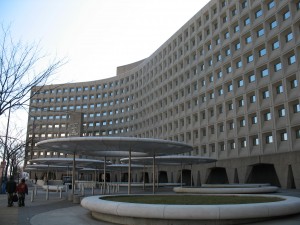
Republican presidential candidate Mitt Romney recently said he'd consider eliminating HUD, whose headquarters are pictured above.
In private comments overheard by reporters, Republican presidential candidate Mitt Romney floated the idea of eliminating the Department of Housing and Urban Development (HUD).
According to the Washington Post, Romney made his comments at a private fundraiser amidst a larger discussion on consolidating government agencies and improving the performance of others.
“I’m going to take a lot of departments in Washington, and agencies, and combine them,” he said. “Some eliminate, but I’m probably not going to lay out just exactly which ones are going to go … things like Housing and Urban Development, which my dad was head of, that might not be around later.”
Housing and the presidential campaign trail have led an interesting relationship since full-time campaigning began in early 2011. Though housing is among the most important sectors of the economy, candidates had largely avoided the topic in their campaigns’ early stages, preferring to vaguely reference the industry’s ills rather than address specific policy measures (though Romney did voice opposition to the government’s foreclosure prevention programs).
That said, Romney received an interesting boost back in December when he placed first in a HomeGain survey that asked Realtors what candidate, among Democrats and Republicans, they supported in the 2012 election. Romney’s 34 percent bested Obama’s 32 percent.
As can be expected in an election season, President Obama’s campaign immediately seized upon Romney’s comments.
Ben LaBolt, a spokesman for the campaign, framed the issue as another sign of Romney’s cozy relationship with the rich, a common theme of the President’s campaign.
“In order to fund his $5 trillion tax cuts for the wealthiest Americans, [Romney] would make deep cuts in programs essential to the middle class like education and housing,” LaBolt said.
And Eddie Eitches, the president of AFGE Local 476, a union representing about 6,000 HUD employees, said in the Post‘s story that Romney is unaware of the full breadth of HUD’s services.
“Most everything he says about the housing industry and the crisis makes no sense,” Eitches said. “We do a lot of things. We engage in fair housing, we stop discrimination, our FHA program provides mortgages for the middle class.”
Peter Moulton, the managing broker for @properties North Shore office, also said that Romney’s comments, and any intentions on winding down operations at HUD, compromise the agency’s original mission.
“HUD was established in 1965 for a diverse group of people,” Moulton said. “It’s original mission, [making homeownership attainable], was commendale.”
And though politics and misuse – Moulton primarily targeted banks and lenders that took advantage of the policies of not only HUD but Fannie Mae and Freddie Mac – have diluted HUD’s mission, its responsibilities would be further inhibited by Romney’s apparent plans for the agency.
Moulton also said that comments such as Romney’s, which come from a more conservative view on finance and economics, do not consider one key, troubling fact – that some aspiring homeowners still experience “huge difficulties” in their search for a home, whether it be economic or discrimination based, in today’s housing market.
“HUD creates the opportunity for those people,” Moulton said, adding that if HUD is eliminated, “that opportunity will disappear.”
But not all of the reactions to Romney’s comments have been negative. Josh Barro of Forbes, for instance, argued for Romney’s position in the boldly titled op-ed “Romney is Right: Abolish HUD.”
Writing that many of HUD’s aforementioned services could be absorbed by other, more relevant agencies, Barro also made a more grand, sweeping argument – that by getting out of the housing industry, local governments would be forced to address the imbalances, in his view, that zoning and other land-use laws create. As a result, prices would fall, housing would be more beholden to free market forces, and homes would become more affordable.
That development, from Moulton’s perspective, seems unlikely.
“That view is somewhat ridiculous,” he said. “Real estate is one of the last free markets in existence.”
Big mistake to cut HUD. The poor, disabled and ill would all be hurt at a time when times are real tough to begin with. Help with food or rent for those that are in trouble is American. What’s going on in America? We pay executives 50 million a year to repackage their employees ideas as their own. The same executives that got a running head start from their connected relatives. We have to support a bloated executive layer of major corporations when we buy anything anywhere. Every wonder how major corporation board members can serve many boards at one time and get paid by each. Only the rich can call this conflict of interest smart. The rich certainly are subsidized by the rest of us.
In Chicago alone EVERY MONTH only over 35,000,000 spent directly on paying rent for section 8. You can figure that by the number of vouchers they have in Chicago, and the fact that the average rent in Chicago is about 1000.
+ administrative costs. Note: Chicago Housing Authority is located in the loop, Jackson boulevard, occupied 2 floors, and has over 100 employees. If each employee receives on average 30k, that makes 3,000,000 only on salaries. If you do not work, just because you do not want to you are poor and eligible for section 8. Generations after generations of people live on this program, just by simply claiming that they do not have any income. Some of these people actually work, but nobody really checks it. It is enough to bring a COPY of two pay stubs and show that your salary is low. This is what they do. Nobody checks if the stubs are fake. Nobody checks anything.
This whole program is a TERRIBLE WASTE.